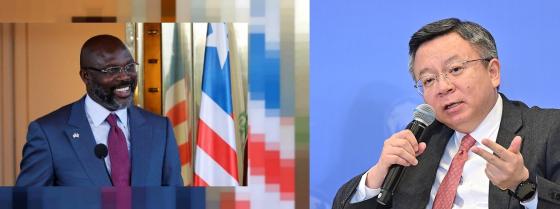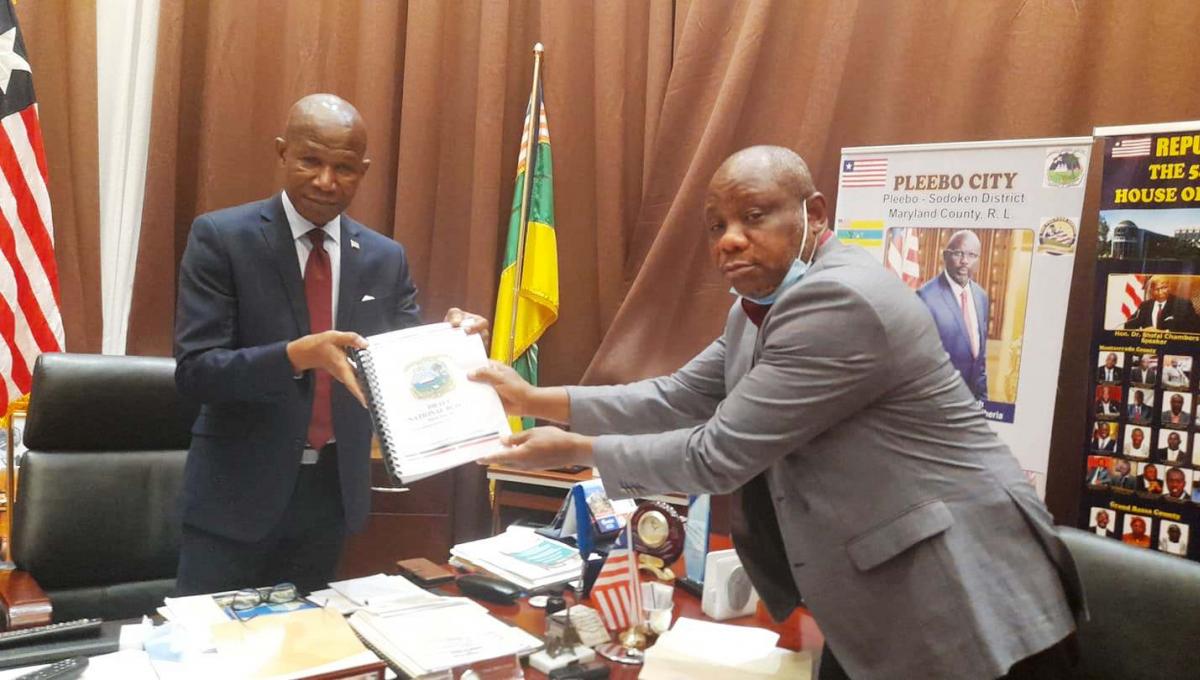Liberia: IMF Approves US$23.64M for Reserve, Debt Payment

President George Manneh Weah (Left) and IMF Acting Chair and Deputy Managing Director Bo Li .
… While the funds might be great for Liberia, the IMF has been accused by some economists of reducing public spending, cutting salaries and benefits.
The International Monetary Fund (IMF) has approved US$23.64 million for the government to lay the foundations for inclusive economic growth and address weaknesses in governance.
The approval by the IMF comes after the completion of Liberia’s third review under the Extended Credit Facility (ECF), which enables the immediate disbursement of the money to restore macroeconomic stability for sustainable inclusive growth.
The IMF added that the government intends to use the allocated fund to strengthen its reserve position, increase spending on the vaccination program, support high-quality development projects, and retire expensive debt.
According to the IMF, its executive board granted a waiver of nonobservance to Liberia by the end of December 2020 on net internal reserves on the basis of corrective action and the external arrears of the government.
“The economy is on track to rebound strongly next year, following the setback from the COVID-19 pandemic,” IMF Acting Chair and Deputy Managing Director Bo Li said following the IMF Executive Board discussion. “The medium-term outlook is favorable and the authorities are committed to the steadfast implementation of their macroeconomic stabilization and structural reform program.”
The IMF in a release noted that despite the challenges from the COVID-19 pandemic, the government of Liberia has kept its program broadly on track and maintained macroeconomic stability, “with the fiscal deficit slightly declining to 4.2 percent of GDP thanks to higher grants, and inflation receding to 13 percent in 2020. “
“While the economy contracted by 3 percent in 2020, for 2021, growth of 3.6 percent is expected, with the fiscal deficit declining further to 2.4 percent of GDP, and inflation reaching the single digits,” the IMF added.
‘High level of recurrent’
The US$23.64 million approval from the IMF came a few days after the World Bank in a report on the Liberia Economic Update, called on the government to reduce the high level of recurrent spending and strengthen domestic revenue mobilization to generate savings for public investment financing.
“Between 2012 and 2020, government operating expenses exceeded the domestic revenue collected by 4 percent of GDP. This means that the external resources mobilized in the period financed a significant part of the government’s operating expenditure instead of financing public investment in infrastructure,” the World Bank said in a hardcopy report.
The report added that despite the government achieving success in a positive turnaround in macroeconomic fundamentals, fiscal gains need to create enough fiscal space to finance the country’s massive investment needs in physical infrastructure.
“The recent efforts to reduce duty waivers and the successful implementation of the pay and payroll reform are steps in the right direction and need to be complemented by actions to improve the efficiency in the consumption of goods and services by the Government,” said Mamadou Ndione, Senior Country Economist and main author of the report.
The World Bank report mirrors information captured in the Ministry of Finance budget circular document that the country lacks enough funds to create the fiscal space needed to support a resilient recovery from policy options.
And quite recently, the Minister of Finance and Development Planning, Samuel D. Tweah Jr., submitted to the Legislature a budget envelope of US$785,587,340.00 to fund the ambitious development agenda of President George Manneh Weah.
However, a massive chunk of the budget goes into servicing public debts, contractual obligations; and clearance of arrears and is happening at a time when the country is faced with a falling growth rate and now classified in the category of a moderate rate of debt distress, limited government ability to borrow to finance projects.
At current, the government account deficit, according to the Ministry of Finance, is projected to widen to 22.3 percent of GDP in 2021 and further to 22.8 percent of GDP in 2022, while the country’s total debt stock as of the end of February 2020 stands at US$1.47 billion, of which domestic debts account for US$604.4 million.
External debt stock accounts for US$861.8 million, with multilateral institutions accounting for US$748.3 million, and bilateral sources, US$113.5 million. Of the domestic debts, the Government of Liberia owes the Central Bank of Liberia US$487.5 million; commercial banks, US$65.2 million; other institutions, US$51.5 million; and claims, US$0.2 million.
The macroeconomic outlook for the fiscal year 2022, made available by the Ministry of Finance, assumes that high levels of uncertainty around the evolution of the COVID-19 and its likely impact on external demand and global and domestic supply chains; and unaddressed vulnerabilities in the financial sector could undermine economic recovery, increase poverty, and weaken Liberia's fiscal and external balances.
Criticism against IMF Funds
While the IMF funds have used their vast resources to help countries in crippling sovereign debt, its approach has however been criticized over the years. The Nobel Prize-winning economist Joseph Stiglitz in his book, Globalization and Its Discontents, wrote that the fund is a primary culprit in the failed development policies implemented in some of the world’s poorest countries.
He argues that many of the economic reforms the IMF required as conditions for its lending — fiscal austerity, high-interest rates, trade liberalization, privatization, and open capital markets — have often been counterproductive for target economies and devastating for local populations.
Another critic, William Easterly, in the book, The White Man’s Burdenargued that many of the fund’s interventions in severely impoverished countries, particularly in Africa and Latin America, as overly ambitious and intrusive. In addition, he describes many of the fund’s loan conditions and technical advice as out of touch with ground-level realities.
Many critics have also accused the IMF of reducing public spending, cutting salaries and benefits, insisting that state-owned enterprises return to the private sector, reduce minimum wages, and restrict collective bargaining.
IMF: “SDR 155 million”
The four-year ECF arrangement, with a total access of SDR 155 million (60 percent of quota or about US$214.30 million) was approved by the IMF Executive Board on December 11, 2019.
Completion of the third review enables the immediate disbursement of SDR 17 million (US$23.64 million), bringing total disbursements under the arrangement to SDR 68 million (US$94.8 million). On August 23, 2021, Liberia received SDR 247.7 million (US$345.3 million) in the context of the general SDR allocation to the IMF’s membership.
However, the IMF claimed that program performance has been mixed, with a favorable fiscal outturn, but delays in the implementation of the structural reform agenda.
It added that the accommodative monetary policy stance improves liquidity and supports the recovery, and the upcoming currency changeover operation brings benefits but requires strong efforts to manage operational risks and the further elaboration of the time-bound implementation plan to ensure a smooth transition
The IMF said further efforts are needed to enhance the central banks’ independence, governance, and transparency.
“Strengthening and developing the financial sector remains a priority. Ongoing bank restructuring and the bolstering of the supervisory toolkit are welcomed measures. The authorities are committed to addressing the high levels of non-performing loans and weaknesses in the AML/CFT regime,” it added.
The release said “Efforts to fight corruption are key to the success of the program and better development prospects for the country. While the recent improvements in transparency and the governance framework are welcome, more rigorous implementation of reforms would help to ensure tangible results. It will be important to accelerate structural reforms to improve the business climate for private sector development.”


